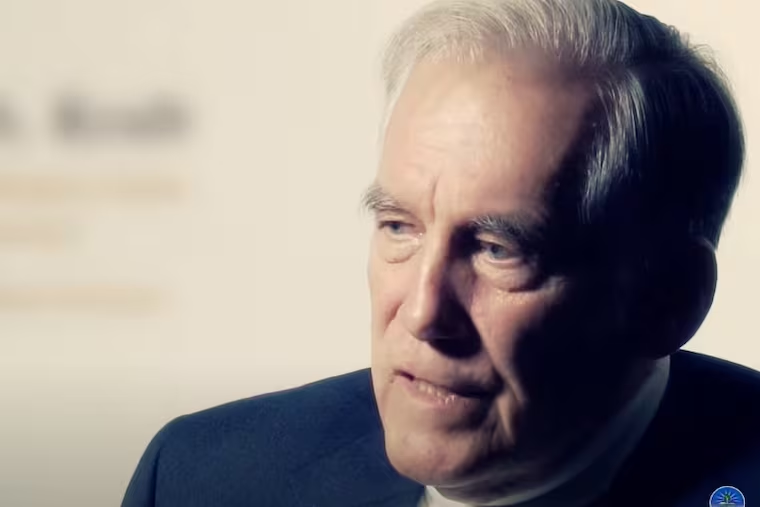Robert A. Kraft, religious studies professor emeritus at Penn, writer, editor, and translator, has died at 89
He was a self-defined “techie,” and a colleague said: “He has worked tirelessly to find new applications for computer technologies in the study of a wide range of ancient texts.”

Robert A. Kraft, 89, of Fort Washington, professor emeritus of the Department of Religious Studies at the University of Pennsylvania, writer, editor, translator, and lecturer, died Friday, Sept. 15, of cancer at Gwynedd Estates retirement community in Ambler.
Inspired by his religious family and driven by his own love of language and literature, Dr. Kraft served as the Berg Professor of Religious Studies at Penn from 1992 until his retirement in 2003. His research and teaching focused on the history and literature of Judaism in the Greco-Roman period from 332 BC to 395 AD, and he pioneered the computer digitization of ancient Jewish scriptures and other documents.
He joined Penn as an assistant professor of religious thought in 1963, became a full professor in 1976, and was chair of the religious studies graduate program. In 1983, he helped Penn students fulfill a new computer literacy requirement that led to innovative computer science classes and groundbreaking digital applications in scholarly research and information dissemination.
“We don’t want to get caught behind in this rapidly expanding field of computers as a tool in humanities research,” he told The Inquirer in 1983. He wrote an article in 1984 for the Council of Societies for the Study of Religion and said: “I have always been intrigued with the frontiers of knowledge in the early Jewish and early Christian worlds, and the computer now promises to permit me better access to those frontiers.”
Dr. Kraft studied the Dead Sea Scrolls, Greek translations of the Hebrew Bible, and other ancient religious manuscripts. He translated works written in Greek, Latin, Hebrew, and Coptic. “He had a knack for language,” said his son Scott.
He worked as an assistant lecturer at the University of Manchester in England from 1961 to 1963 and was visiting lecturer at the Lutheran Theological Seminary in Philadelphia in 1965 and 1966. He cofounded the Philadelphia Seminar on Christian Origins in 1963, was president of the Society of Biblical Literature in 2006, and belonged to many religious studies committees and organizations.
He wrote hundreds of articles and papers about his research, reviewed books, was an editor for many publications, and lectured around the world. He was quoted often in The Inquirer and other publications about his research and advances in computer science.
Asked in 2017 by fellow scholar and online blogger William A. Ross about the future of ancient biblical studies, Dr. Kraft said: “It is what you will make of it. I’ll be gone, but hopefully what remains from the work I’ve been involved in will help move things along to firmer and more interesting results for the study of ancient Jewish and Christian attitudes and activities.”
Robert Alan Kraft was born March 18, 1934, in Wolcott, Conn. He grew up in a religious family, was a competitive swimmer for a time, and won a Rensselaer Polytechnic Institute award for science and math as a high school senior.
He earned a bachelor’s degree in philosophy at Wheaton College in Illinois in 1955, a master’s degree in Biblical literature of the New Testament at Wheaton in 1957, and a doctorate in the history and philosophy of religion and Christian origins at Harvard University in 1961. He received a Guggenheim Fellowship grant in 1969 and was a fellow at the American Council of Learned Societies in 1975.
He met Carol Wallace at Wheaton, and they married in 1955, and had daughter Cindy and sons Scott, Todd, and Randy. They lived in Roslyn and Fort Washington, and spent many long summer days walking the beach in Ocean City.
Dr. Kraft collected stamps, coins, post cards, and antique radios. He rebuilt old cars, solved puzzles, wrote poetry, and liked to backpack with his family on the Appalachian Trail.
He was known for his puns and jokes, and always made time to boogie board in the surf with his grandchildren. “He was even-keeled, friendly, and quiet,” his son Scott said.
Asked in 2013 about the value of progressive Christianity, Dr. Kraft told colleagues at ProgressiveChristianity.org: “Progressive, in the sense of trying to take whatever you think is valuable in the Christian message and see how it can work out in the world in which you really live, makes good sense to me.”
In addition to his wife and children, Dr. Kraft is survived by nine grandchildren, two brothers, a sister, and other relatives.
Services are to be held later.
Donations in his name may be made to the Wolcott Historical Society, Box 6410, Wolcott, Conn. 06716; and the Society of Biblical Literature, The Luce Center, 825 Houston Mill Rd., Atlanta, Ga. 30329.